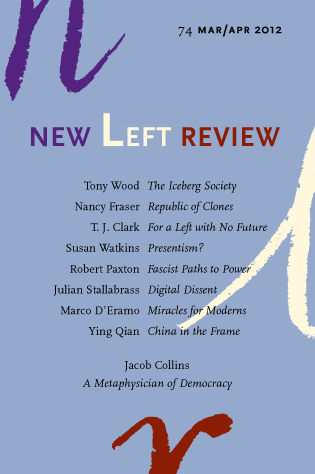While Russia’s anti-Putin demonstrations have prompted talk of a civic awakening—led by a flat-pack middle class—the country’s overall social landscape remains largely unmapped. Tony Wood surveys its shifting structures since the Soviet collapse, and the consequences of marketization’s advance through the USSR’s ruins.
Conceptions of justice drawn from Plato to Rawls, explored through analysis of a powerful novel by Kazuo Ishiguro. Who counts as a subject, and what strategies could enable those debarred from the sphere of justice to overturn their status?
An epistle to capitalism’s immobilized opponents from the author of Farewell to an Idea. Drawing on sources from Bruegel to Nietzsche, Hazlitt to Benjamin, T. J. Clark supplies notes for a rethinking of left politics that would recognize the impasses of the present and the horrific legacies of the past, while abandoning the mirages of futurity.
Responding to Clark, Susan Watkins questions the adequacy of a perspective built upon man’s propensity for violence, and defends a historicized politics of social transformation against the cramped horizon of the present.
Origins and mutations of the PRC’s independent documentary movement. From vanguard to grass roots, and from passive observation of a country in flux to a politicized, activist cinema, turning its lens onto the workings of power.
A tonic for cyber-babble from the pages of Mute magazine, assessing the real impact of new technology on politics and cultural life. Can this valuable source of critique survive in a cold recessionary landscape?
Robert O Paxton on Dylan Riley, The Civic Foundations of Fascism. Civil society revealed as handmaiden of fascist rule in Italy, Spain and Romania.
Jacob Collins on Marcel Gauchet, L’avènement de la démocratie, t. III. Europe’s age of catastrophe as struggle between religious and secular political logics, in the vision of a sotto voce liberal.
Marco D’Eramo on Sergio Luzzatto, Padre Pio. A scholarly view of Italy’s most famous cleric and the cult he inspired.
